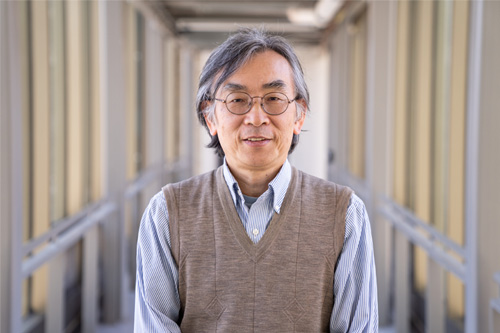Media
Contact
Communications Specialist
Faculty of Engineering
Spencer Engineering Building
Room 2072
Western University
Tel: 519-661-2111 ext. 87015
Email: engineeringcomms@uwo.ca
Professor Han-Ping Hong honoured for excellence in research
Each year, Western Engineering presents a faculty member with the Engineering Award for Excellence in Research to recognize their outstanding research contributions. Civil and environmental professor Han-Ping Hong is this year’s recipient, recognized for his internationally leading expertise in structural reliability.
“Winning this award means a lot to me,” said Hong. “It's an honour to be recognized by my peers for the work that I have done. It motivates me to work even harder and to continue to strive for excellence in my research.”
Hong is a distinguished researcher who specializes in investigating the degradation of structures over time through the application of advanced mathematical and computer modeling techniques. His research focuses on understanding the effects of natural disasters, such as earthquakes and corrosion, on structures such as pipelines. Hong has made significant contributions to the field by developing novel data analysis methods and predictive models to assess the long-term integrity of these structures. He has also devised innovative approaches to optimize maintenance and repair strategies for these systems.
understanding the effects of natural disasters, such as earthquakes and corrosion, on structures such as pipelines. Hong has made significant contributions to the field by developing novel data analysis methods and predictive models to assess the long-term integrity of these structures. He has also devised innovative approaches to optimize maintenance and repair strategies for these systems.
Among his many impressive feats is the estimation and mapping of the new Canadian wind and snow hazard maps, which are vital for Canadian structural design practice.
“The maps provide the basis to update the wind and snow loads for different sites and cities that are included in the National Building Code of Canada (NBCC) and the Canadian Highway Bridge Design Code (CHBDC),” explained Ashraf El Damatty, department chair, Civil and Environmental Engineering.
“Most importantly, his research results on the reliabilitybased design code calibration – that balances the life safety requirement and economic efficiency – led to changes to the environmental and companion load factors implemented in the NBCC and CHBDC. These load factors are used by every structural engineer who designs and constructs buildings or bridges in Canada,” he added.
When asked to share the motivating factor for his research, Hong shared that he has a “passion for finding solutions to complex problems.” He also spoke of a nurturing departmental environment that fosters collaboration with talented colleagues that inspires him to constantly strive for excellence.
Gregory Kopp, professor, department of Civil and Environmental Engineering and ImpactWX Chair in Severe Storms Engineering, shared, “Hong’s work covers a remarkably broad range, unlike any other researcher that I have seen at Western.”
“This breadth is special because each of these topics requires careful and detailed understanding. I think he has also provided leadership in research by creatively approaching solutions for societal issues.”
Since joining the department in 1996, Hong has successfully trained 50 graduate students and mentored eight postdoctoral fellows. Many of his students have gone on to high-impact academic or industry careers, including appointments as Canada Research Chairs, or have made significant impacts on engineering practices as specialized consultants.
Another colleague, Mahesh Pandey, Industrial Research Chair at the Natural Sciences and Engineering Research Council (NSERC), said, “professor Hong has a unique ability to work on theoretical and practical aspects of research topics and has an outstanding publication record with over 200 journal papers. The quality of his work is evident by the fact that most of his publications appear in highly reputable journals.”
Additionally, because of Hong’s outstanding contributions to civil engineering, he was named as a Fellow of the Canadian Academy of Engineering in 2022. He is an active member of various non-profit or non-government organizations, such as design code committees and the International Standard Organization. He has also received numerous awards locally and internationally, including the Casimir Gzowski Medal from the Canadian Society for Civil Engineering.

